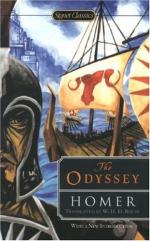“Thus he spoke, and the Achaeans feared no more. The daughters of the old man of the sea stood round you weeping bitterly, and clothed you in immortal raiment. The nine muses also came and lifted up their sweet voices in lament—calling and answering one another; there was not an Argive but wept for pity of the dirge they chaunted. Days and nights seven and ten we mourned you, mortals and immortals, but on the eighteenth day we gave you to the flames, and many a fat sheep with many an ox did we slay in sacrifice around you. You were burnt in raiment of the gods, with rich resins and with honey, while heroes, horse and foot, clashed their armour round the pile as you were burning, with the tramp as of a great multitude. But when the flames of heaven had done their work, we gathered your white bones at daybreak and laid them in ointments and in pure wine. Your mother brought us a golden vase to hold them—gift of Bacchus, and work of Vulcan himself; in this we mingled your bleached bones with those of Patroclus who had gone before you, and separate we enclosed also those of Antilochus, who had been closer to you than any other of your comrades now that Patroclus was no more.
“Over these the host of the Argives built a noble tomb, on a point jutting out over the open Hellespont, that it might be seen from far out upon the sea by those now living and by them that shall be born hereafter. Your mother begged prizes from the gods, and offered them to be contended for by the noblest of the Achaeans. You must have been present at the funeral of many a hero, when the young men gird themselves and make ready to contend for prizes on the death of some great chieftain, but you never saw such prizes as silver-footed Thetis offered in your honour; for the gods loved you well. Thus even in death your fame, Achilles, has not been lost, and your name lives evermore among all mankind. But as for me, what solace had I when the days of my fighting were done? For Jove willed my destruction on my return, by the hands of Aegisthus and those of my wicked wife.”
Thus did they converse, and presently Mercury came up to them with the ghosts of the suitors who had been killed by Ulysses. The ghosts of Agamemnon and Achilles were astonished at seeing them, and went up to them at once. The ghost of Agamemnon recognised Amphimedon son of Melaneus, who lived in Ithaca and had been his host, so it began to talk to him.
“Amphimedon,” it said, “what has happened to all you fine young men—all of an age too—that you are come down here under the ground? One could pick no finer body of men from any city. Did Neptune raise his winds and waves against you when you were at sea, or did your enemies make an end of you on the mainland when you were cattle-lifting or sheep-stealing, or while fighting in defence of their wives and city? Answer my question, for I have been your guest. Do you not remember how I came to your house with Menelaus, to persuade Ulysses to join us with his ships against Troy? It was a whole month ere we could resume our voyage, for we had hard work to persuade Ulysses to come with us.”




